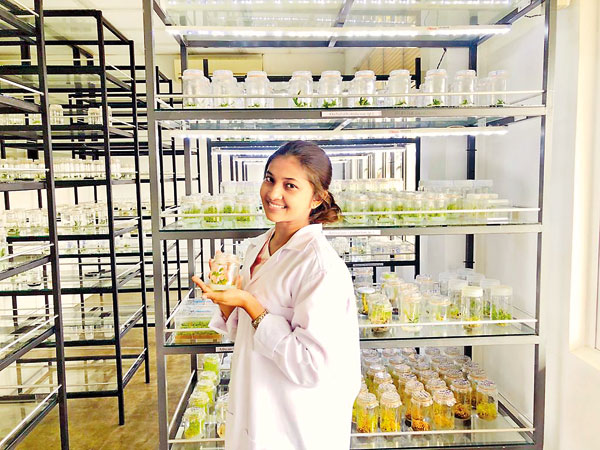Student of Horizon Campus completes research project on Stevia Rebaudiana a zero calorie sweetener plant
View(s):In the very fast developing scenario of biological science, plant tissue culture has taken the lead as one of the most promising areas of application of biotechnological tools for the future of agriculture. The use of in vitro technology for commercial propagation of plant species and for the production of bioactive components from them has become a profitable industry worldwide that will serve not only agriculture but also industries in the medical and pharmaceutical fields.
 Horizon Campus has become one of the leading private higher education institutes in the country that has made a mark in honing the skills of many future scientists in this sphere. Their degrees are offered in partnership with the prestigious Nilai University in Malaysia which is slated as a top university in Asia for biotechnology.
Horizon Campus has become one of the leading private higher education institutes in the country that has made a mark in honing the skills of many future scientists in this sphere. Their degrees are offered in partnership with the prestigious Nilai University in Malaysia which is slated as a top university in Asia for biotechnology.
One of their most recent success stories has been of Pubudini Thilakarathne who completed her degree in BSc (Hons) in Biotechnology from the NILAI University Malaysia with flying colors, winning a gold medal and being also selected for the Deans’ list.
Based on her final year research she completed a project paper on promoting Stevia rebaudiana cultivation in Sri Lanka using tissue culture techniques. Stevia can have a huge demand potential in Sri Lanka, since it is a natural sweetener without calories. Hence, cultivating it in Sri Lanka would benefit the large population of diabetic patients in Sri Lanka. The cultivation of this plant can result in the pharmaceuticals, confectionary and soft drink industries using calorie free products in Sri Lanka
Speaking of her achievements in the industry Pubudini stated “The curriculum of my degree was an intensive one and provided me with theoretical information and practical experience in plant tissue culture. Special emphasis was placed on setting-up and operating a plant tissue culture laboratory. Diagnostic skills were taught as tools for determining the source(s) of in vitro plantlet problems. Discussions pertaining to solving such problems were an active and integral part of the degree. Scientific verbal and writing skills appropriate for the field of plant tissue culture were introduced and honed.
“Overall, this degree developed my capabilities and comprehension in the applications of plants in cell and tissue culture systems, and how cell and tissue culture contributes to global sustainability. It also developed my practical skills and confidence of successfully culturing plant cells and tissues.”
She added “the course work prepared me for immediate employment in the plant tissue culture industry. Consequently, the transition from academia to industry was a natural one and enabled me the chance to do my internship at Navesta, one of the country’s leading privately owned pharmaceutical manufacturers. My internship at Navesta Pharmaceuticals Private Limited allowed me to have a hands on experience and to apply the laboratory experience I had learned in the classroom in a real-world setting. I got the chance to work both independently and as a team to complete projects. I also had the privilege to interact with specialists in my field who provided their guidance and insight. Getting the chance to work at a dynamic and futuristic company such as Navesta has greatly helped me to make a head start in my career. This wonderful experience has also allowed me to apply the techniques I learnt in my research activities and along with the knowledge gained helped me produce my research project in promoting Stevia cultivation in Sri Lanka that I believe will benefit the diabetic population in the county as well as the related industries to promote healthy options for these patients. I have also gained the confidence and know how to teach the subject to others. This motivated me to start working as a lecturer at Horizon Campus after completing my tenure with Navesta. I have currently completed a successful year as a lecturer and hope to continue my research work as well. “
Commenting on Pubudini’s achievements, the Dean Faculty of Science at Horizon Campus Dr. Lekha Wanasakera stated “One of our objective is to train the necessary talent suited to the needs of Plant Tissue Culture Industry in the country, who will deliver value to the industry, whilst also imparting the right training to develop entrepreneurship skills. Pubudini is strong testament to what we always aspire to achieve with our students at the Campus”.
Interested parties in the said field can obtain further information by visiting www.horioncampus.edu.lk or by contact 0713 159 159, 0716 613 613 or 0114 365 555 or visit Horizon Campus at Malabe.


